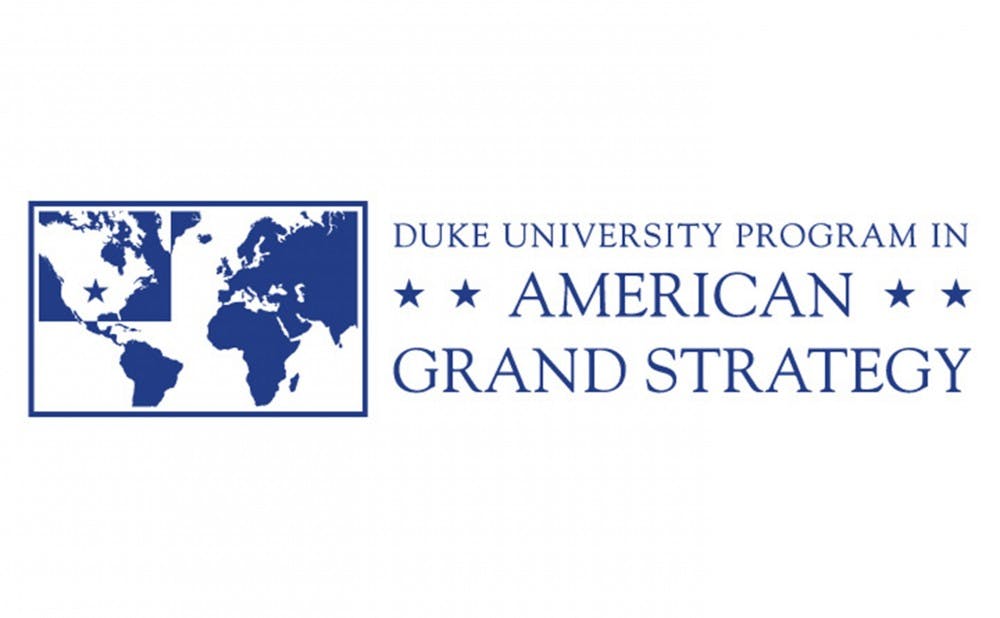American Grand Strategy—an interdisciplinary campus initiative—publicized information related to a designated hate group last week.
In a Sept. 26 email newsletter, the Duke University Program in American Grand Strategy promoted several upcoming events happening on or near campus. In the “Events from our Friends” section, the email included a reference to a lecture from Frederick Fleitz, senior vice president for policy and programs with the Center for Security Policy—a Washington think tank designated by the Southern Poverty Law Center as a hate group.
If I were [aware that it was classified in such a way], I would have flagged that,” said Melanie Benson, program coordinator for AGS. “We’re sent information on talks at Duke or in the surrounding area on a regular basis, and if the talks are on a topic that is squarely within our wheelhouse—which is the response of American foreign policy to global challenges—we consider them."
Despite having previewed the think tank’s website to prepare a biography for Fleitz, she said that she did not know the Center for Security Policy was classified as a hate group. When scouting events to highlight in emails, AGS considers the topic, the speakers and their professional history, she added.
Benson said Peter Feaver, professor of political science and director of AGS, took the lead with vetting the Center for Security Policy. He was approached by contacts at Icon Lecture Series—a Raleigh nonprofit that hosts speakers covering salient political issues—asking that he forward information related to the event.
Feaver did not make it clear whether he knew that the Center for Security Policy was a considered a hate group, but he did note that the publicity should not be mistaken for support.
"Getting advertised by AGS is not a sign that we endorse every position a speaker might take; rather it is an endorsement that this speaker is likely to offer an interesting or important perspective on matters of consequence,” Feaver wrote in an email.
He noted that AGS strives to expose students and the community to a wide range of perspectives on international relations.
“We are especially alert to speakers whose views might not normally get presented in this area, and who are particularly influential in the current Administration," he wrote.
The Center for Security Policy “has gone from a respected hawkish think tank focused on foreign affairs to a conspiracy-oriented mouthpiece for the growing anti-Muslim movement in the United States” since its establishment in 1988, according to its profile on Southern Poverty Law Center’s website.
President Donald Trump attended rallies and summits hosted by the group during his 2016 presidential campaign.
In a 2015 press release calling for a ban on Muslims entering the United States, the Trump campaign cited a Center for Security Policy study that was later debunked. The poll claimed that a quarter of all Muslims living in the United States believe violence against Americans is justified under global jihad, and that half believe they should have the choice of being governed according to Sharia.
Lane Pickett, communications assistant at the Southern Poverty Law Center, said the think tank was labeled a hate group for its anti-Muslim rhetoric in 2015.
But despite this designation, Feaver wrote that the event–scheduled for Oct. 17—will focus on Iran and North Korea, which is worth advertising.
“The CSP has been around a long time and their views are well known and widely reported,” Feaver wrote. “They also provide a useful window into the thinking of the Trump Administration.”
He continued that although the SPLC has an extensive history with well-known views, AGS acts independently of their influence.
“As a university, we should not let any outside group impose a blacklist or seek to prevent us from at least hearing about different points of view,” he wrote.
Get The Chronicle straight to your inbox
Signup for our weekly newsletter. Cancel at any time.

